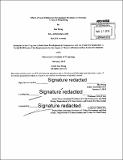| dc.contributor.advisor | Daniel Rose. | en_US |
| dc.contributor.author | Wang, Shu | en_US |
| dc.contributor.other | Massachusetts Institute of Technology. Center for Real Estate. Program in Real Estate Development. | en_US |
| dc.coverage.spatial | a-cc-hk | en_US |
| dc.date.accessioned | 2015-07-31T19:07:57Z | |
| dc.date.available | 2015-07-31T19:07:57Z | |
| dc.date.copyright | 2015 | en_US |
| dc.date.issued | 2015 | en_US |
| dc.identifier.uri | http://hdl.handle.net/1721.1/97957 | |
| dc.description | Thesis: S.M. in Real Estate Development, Massachusetts Institute of Technology, Program in Real Estate Development in conjunction with the Center for Real Estate, 2015. | en_US |
| dc.description | Cataloged from student-submitted PDF version of thesis. | en_US |
| dc.description | Includes bibliographical references (pages 72-74). | en_US |
| dc.description.abstract | The objective of this thesis is to investigate the effects of land supply on housing prices in Hong Kong. Studies will be carried out to define whether there are any correlation between land supply, housing supply and residential property prices. In order to better understand Hong Kong's housing market, this study will first present a background of establishment of Hong Kong's land tenure system, land administration system and the government's land sale process, while trying to answer the question of whether the perceived shortage in housing supply is a direct consequence of the shortage in government's land supply. The study then examines the concentration of market shares among a handful of developers and the high barrier to entry that have resulted in such anti-competitive environment. The study analyzes the leading developers' competitive advantages in terms of land bank and financial strength, and their housing supply strategies in relation to the government's land supply decisions. This paper will then insert the theoretical findings into realistic settings of Hong Kong's housing development industry, and apply the methodology of event study to detect the impact of real estate companies' development strategies and how it alters the perceived relationship between the supply of land and the supply of housing. By simultaneously considering the effects of development strategies with government land policies, the paper aims to better evaluate governments measure to regulate housing market and hope to recommend more effective policies on residential land supply in Hong Kong. | en_US |
| dc.description.statementofresponsibility | by Shu Wang. | en_US |
| dc.format.extent | 74 pages | en_US |
| dc.language.iso | eng | en_US |
| dc.publisher | Massachusetts Institute of Technology | en_US |
| dc.rights | M.I.T. theses are protected by copyright. They may be viewed from this source for any purpose, but reproduction or distribution in any format is prohibited without written permission. See provided URL for inquiries about permission. | en_US |
| dc.rights.uri | http://dspace.mit.edu/handle/1721.1/7582 | en_US |
| dc.subject | Center for Real Estate. Program in Real Estate Development. | en_US |
| dc.title | Effects of land policies and development strategies on housing : a case of Hong Kong | en_US |
| dc.type | Thesis | en_US |
| dc.description.degree | S.M. in Real Estate Development | en_US |
| dc.contributor.department | Massachusetts Institute of Technology. Center for Real Estate. Program in Real Estate Development. | en_US |
| dc.contributor.department | Massachusetts Institute of Technology. Center for Real Estate | |
| dc.identifier.oclc | 913875382 | en_US |
